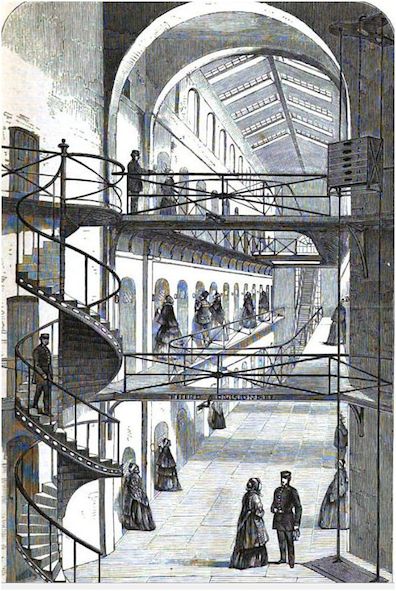"Kevin Egan" is Joyce's fictional avatar for Joseph Casey, a
fenian who was involved in the
revolutionary actions of the 1860s. Egan now lives quietly in
Paris, working as a typesetter, drinking absinthe, and rolling
"gunpowder cigarettes" whose shreds of tobacco evoke the more
incendiary material of the Clerkenwell
bomb fuse. Both Stephen, in Proteus, and the
Citizen, in Cyclops, recall meeting him there.
Joseph Theobald Casey, born in Kilkenny in 1846, was a cousin
and godson to James Stephens,
who founded the Irish Republican Brotherhood in 1858. He was
arrested for alleged involvement in the attack on the police
van in Manchester in September 1867, and imprisoned in
London's high-security Clerkenwell Prison. In December 1867 a
plot to free him and other Fenians by blowing up a wall of the
prison failed.
In a subsequent trial, Casey was acquitted of the charges
against him. He moved to Paris, and eventually he took a job
as a typesetter ("fingers smeared with printer's ink")
for the New York Herald, which opened a press in
that city in 1877. As the young James Joyce prepared to move
to Paris in 1902, he wrote to Lady Gregory about his plans,
mentioning that "I know of a man who used to live somewhere
near Montmartre but I have never met him" (Ellmann 107). He
met that man, Casey, on several occasions in 1902 and 1903,
and became familiar with his life: "Making his day's
stations, the dingy printingcase, his three taverns, the
Montmartre lair he sleeps short night in." Both
Joseph and his son Patrice lent the impoverished Joyce small
amounts of money. The James Joyce Centre's website,
jamesjoyce.ie, notes that on 17 March 1903 Joyce sent his
mother a postcard, complaining that no one at home had sent
him a shamrock to commemorate St. Patrick's Day, but
mentioning that Joseph Casey had given him some. Casey died in
Paris in 1907.
Ellmann notes that Joyce and Casey would meet for lunch at
the Restaurant des Deux-Écus near the Herald
building (125), and it seems to be this setting that Stephen
recalls when he thinks of Kevin Egan sipping his absinthe
while "About us gobblers fork spiced beans down their
gullets." The narrative also preserves the memory
of Casey's son Patrice, who served as a soldier in the French
army ("Mon fils, soldier of France"),
and of his estrangement from his wife: "She is quite
nicey comfy without her outcast man, madame in rue
Git-le-Coeur, canary and two buck lodgers. Peachy
cheeks, a zebra skirt, frisky as a young thing's."
The three long paragraphs devoted to Stephen's memories of
his conversations with Kevin Egan give a pitying account: "Weak
wasting hand on mine. They have forgotten Kevin Egan, not he
them." The aging man with "Raw facebones
under his peep of day boy's hat" wants Stephen to
know that he once cut a fine figure: "I was a
strapping young gossoon at that time, I tell you. I'll show
you my likeness one day. I was, faith." He wants to
relive the glory days of his youth and talk about current
hopes for independence, but Stephen resists an appeal that
sounds to him like cooptation: "To yoke me as his yokefellow, our crimes
our common cause." Stephen thinks that he lives in
a vanished world "Of lost leaders, the betrayed, wild
escapes. Disguises, clutched at, gone, not here."
Like the follies of his own youth, and the disorder of his
uncle's house, and the rotting remnants of things strewn about
the tide flats, Egan's life registers in his consciousness as
an emblem of ruinous protean flux.
Nevertheless, Joyce sought out this man in Paris, and Stephen
seems not only to have spent some considerable time with Egan,
but also to have formed some sense of personal connection.
Later in Proteus, stretching his frame back across
some rocks, and nudging his hat down over his eyes against the
sun, he thinks, "That is Kevin Egan's movement I made,
nodding for his nap, sabbath sleep."

